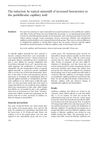Search
for
Sort by
Research
120-150 / 1000+ results
research DNA Determination of Human Hair Bulbs in Normal and Androgenetic Alopecia
Hair loss happens due to faster cell growth and fewer cells in affected follicles.

research Immunolocalization of Telomerases in Human Hairs Identifies Proliferating Cells in the Bulb Matrix and Outer Root Sheath
Telomerase-positive cells are mainly in the bulb matrix and outer root sheath of hair follicles.

research Hair Follicle Bulb Developed as 3D Scaffold-Free Microtissue
Scientists created a tiny, 3D model of a hair follicle that grows and acts like a real one.

research Stress-Sensing in the Human Greying Hair Follicle: Ataxia Telangiectasia Mutated (ATM) Depletion in Hair Bulb Melanocytes in Canities-Prone Scalp
Hair greying is linked to reduced ATM protein in hair cells, which protects against stress and damage.

research Anagen Effluvium in Association With Extracorporeal Membrane Oxygenation
A critically ill boy experienced hair loss likely due to the stress of his medical treatments, but his hair regrew completely in 1.5 months.

research Hair Follicle Immune Privilege Revisited: The Key to Alopecia Areata Management
Restoring hair bulb immune privilege is crucial for managing alopecia areata.

research Melatonin and the Hair Follicle
Melatonin helps regulate hair growth and protects the hair follicle from stress.
research Sex Hormones and Antiandrogens Influence Growth of Dermal Papilla Cells and Outer Root Sheath Keratinocytes of Human Hair Follicles In Vitro
Testosterone and dihydrotestosterone can slow down the growth of certain hair follicle cells.

research Hair Follicle Stem Cells: Walking the Maze
Hair follicle stem cells are key for hair and skin regeneration, can be reprogrammed, and have potential therapeutic uses, but also carry a risk of cancer.
research Alopecia Areata with Lymphocytic Mural Folliculitis Affecting the Isthmus in a Thoroughbred Mare
The horse had a rare type of hair loss caused by immune cells attacking hair follicles.

research Clinical Analysis and Treatments for Androgenetic Alopecia in Men
Hair loss treatments increased hair density and reduced hair loss in most men, but didn't improve hair thickness for everyone.

research Alopecia in Cronkhite-Canada Syndrome: Is It Truly Telogen Effluvium?
Hair loss in Cronkhite-Canada syndrome may be caused by autoimmune factors, not just stress or malabsorption.

research Hair-Cycle Dependent Differential Expression of ADAM 10 and ADAM 12
ADAM 10 and ADAM 12 proteins are involved in different stages of hair growth and could be targets for treating hair disorders.

research The Induction by Topical Minoxidil of Increased Fenestration in the Perifollicular Capillary Wall
Minoxidil increased small openings in blood vessel walls near growing hair in rats.

research Histopathology of the Alopecias
Examining scalp tissue under a microscope helps diagnose and understand hair loss diseases.
research Sex Hormones and Antiandrogens Influence In Vitro Growth of Dermal Papilla Cells and Outer Root Sheath Keratinocytes of Human Hair Follicles
Sex hormones and antiandrogens can either stimulate or inhibit human hair follicle cell growth depending on the dose.

research Anagen Effluvium: A Review of Rapid Hair Loss During Growth Phase and Loose Anagen Hair Syndrome
Hair usually grows back 1-3 months after treatment for anagen effluvium, and children with Loose Anagen Hair Syndrome often improve by adolescence.

research Effects of Epidermal Growth Factor, Fibroblast Growth Factor, Minoxidil, and Hydrocortisone on Growth Kinetics in Human Hair Bulb Papilla Cells and Root Sheath Fibroblasts Cultured In Vitro
EGF and FGF boost hair cell growth, hydrocortisone slows it, and minoxidil doesn't affect it.

research A Spermidine-Based Nutritional Supplement Prolongs the Anagen Phase of Hair Follicles in Humans: A Randomized, Placebo-Controlled, Double-Blind Study
A spermidine-based supplement may help hair grow longer by keeping it in the growth phase.

research Thyroid Hormones Directly Alter Human Hair Follicle Functions: Anagen Prolongation and Stimulation of Both Hair Matrix Keratinocyte Proliferation and Hair Pigmentation
Thyroid hormones help hair grow, reduce hair loss, and increase hair pigment.

research An Extract of Leontopodium Alpinum Prolongs Anagen Phase in Human Hair Follicles Ex Vivo
Leontopodium alpinum extract may help reduce hair shedding by keeping hair in the growth phase longer.
research Transcriptome Profiling and Differential Gene Expression in Canine Microdissected Anagen and Telogen Hair Follicles and Interfollicular Epidermis
Different genes are active in dogs' hair growth and skin, similar to humans, which helps understand dog skin and hair diseases and can relate to human conditions.

research Immune Privilege and Alopecia Areata
Restoring immune privilege in hair follicles could help treat certain types of hair loss.

research Treatment of Hair Loss
Finasteride and minoxidil are effective for hair loss, but continued research is needed for better treatments.

research Human Hair Follicle Organ Culture: Theory, Application, and Perspectives
Human hair follicle organ culture is a useful model for hair research with potential for studying hair biology and testing treatments.

research A Guide to Assessing Damage Response Pathways of the Hair Follicle: Lessons From Cyclophosphamide-Induced Alopecia in Mice
The document concludes that assessing hair follicle damage due to cyclophosphamide in mice involves analyzing structural changes and suggests a scoring system for standardized evaluation.

research Identifying Novel Strategies for Treating Human Hair Loss Disorders: Cyclosporine A Suppresses the Wnt Inhibitor, SFRP1, in the Dermal Papilla of Human Scalp Hair Follicles
Cyclosporine A may help treat hair loss by blocking a protein that inhibits hair growth.

research Premature Graying of Hair: Causes, Associations, and Treatments
Premature graying of hair may suggest health issues and currently lacks effective treatments.

research Estrogens and Human Scalp Hair Growth: More Questions Than Answers
The effects of estrogen on human hair growth are unclear and need more research.